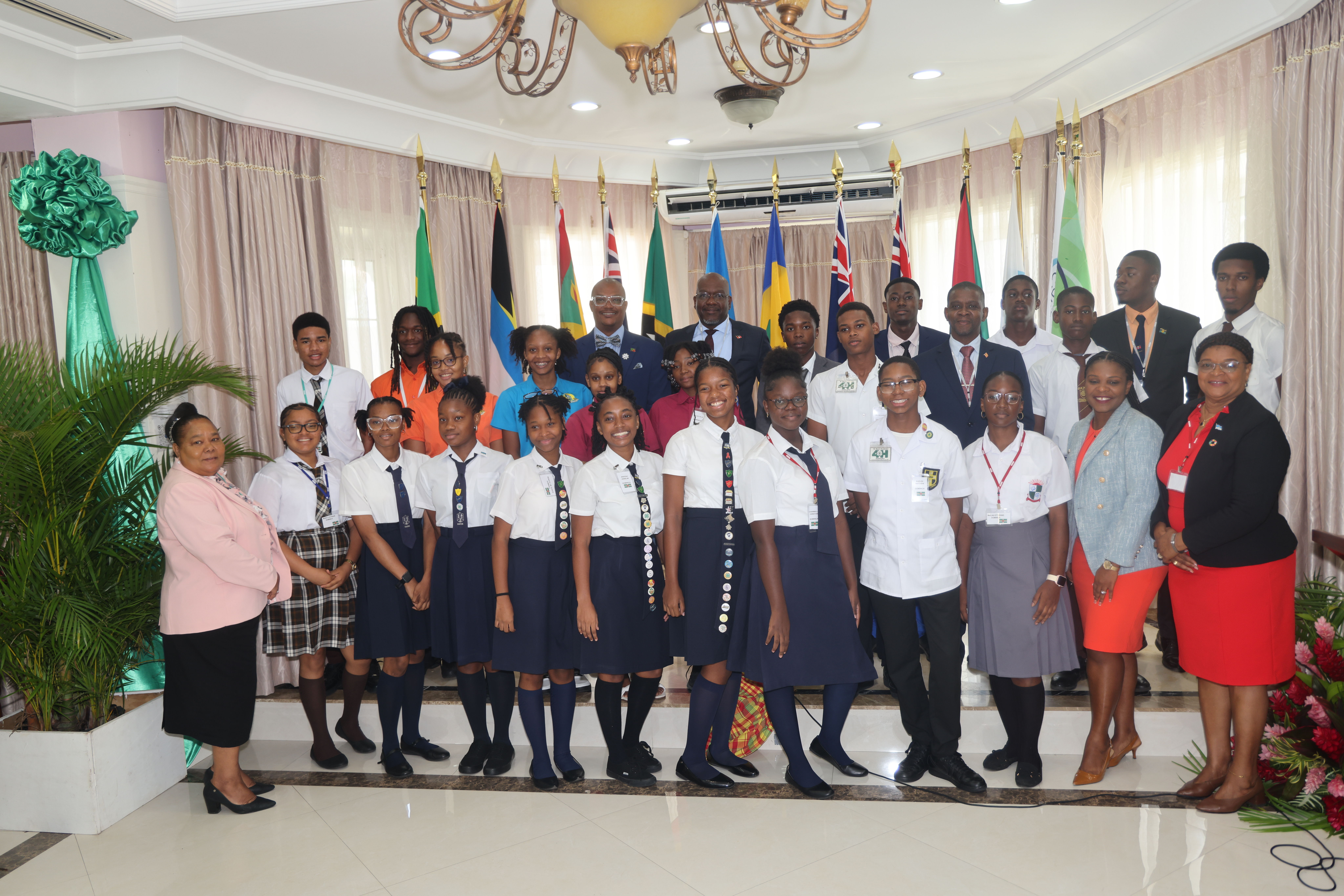OECS Successfully Concludes Tenth Meeting of the OECS Council of Ministers: Education
OECS Media Release
The Tenth Meeting of the OECS Council of Ministers: Education (COM: Edu) was successfully hosted by the Commonwealth of Dominica at the State House Conference Centre from September 25-26, 2025.
Convened under the theme "Empowered Teaching for Resilient and Inclusive Digital Education", the high-level education meeting was attended by Ministers of Education, Permanent Secretaries, Directors from Ministries of Education, Development Partners, and education experts. Youth representatives were also invited to participate to ensure youth voices are meaningfully integrated into discussions as part of the OECS's continued prioritisation of youth engagement through the OECS Youth Empowerment Strategy. The 2025 COM: Edu promoted regional policy discussions on education, fostering substantive exchanges and strategic collaboration among Ministers and education leaders in the region to advance the transformation of education systems by aligning national efforts with the strategic priorities of the OECS Education Sector Strategy.
The 2025 COM: Edu built on the discussions advanced at last year's meeting and advances on a year of active implementation by the Organisation of Eastern Caribbean States Commission of the key decisions. The meeting focused on accelerating and sustaining buy-in and uptake of the OECS Digital Learning Ecosystem. It further emphasised the importance of teacher training and capacity development, reaffirming commitment to quality and inclusive education for the twenty-first century.
The meeting commenced with an inspiring opening ceremony highlighting the cultural richness of the Commonwealth of Dominica. Delivering remarks, the Honourable Dr. Geoffrey Hanley, Deputy Prime Minister and Minister of Education, Youth Empowerment, Housing and Human Settlement, Ecclesiastical and Faith-Based Affairs, Social Development, Gender Affairs, Ageing and Disabilities, the Federation of Saint Kitts and Nevis, and Outgoing Chair of the OECS Council of Ministers: Education stated,
"This year, we will be guided by the theme 'Empowered Teaching for Resilient and Inclusive Digital Education,' taking into consideration the twenty-first-century needs of both our teachers and students. Despite the challenges before us, so too are the opportunities. We are uniquely positioned to reimagine education, to invest in teacher development, to prioritise mental health and well-being and to ensure that every child, regardless of geography, ability or socio-economic status, has access to a quality education."
His Excellency Dr. Didacus Jules, Director General of the OECS, stated:
"It is an honour to welcome you to the Tenth Council of Ministers of Education. We are gathered in the Commonwealth of Dominica and virtually across our region and the world, united under the theme "Empowered Teaching for Resilient and Inclusive Digital Education". This theme captures both the challenge and the promise before us. It reminds us that education is not transformed by technology alone, nor by policies written on paper. I want to emphasise that the failure to make real change in education does not come from a lack of technical solutions. It comes from the tendency to treat reform as a patchwork of disconnected initiatives."
The Honourable Octavia Alfred, Minister for Education, Human Resource Planning, Vocational Training, and National Excellence, the Commonwealth of Dominica, and Incoming Chair of the OECS Council of Ministers: Education, stated:
"The past few years have reminded us that our education systems are only as strong as their ability to adapt. Natural disasters, pandemic, economic shocks, global and regional disruptions, decline in patriotism among our people and cultural penetration that threatens our true Caribbean identity, these have not only tested the resilience of our nations and our people but have made evident the vulnerabilities within our systems. Education as a bedrock of national development must be fortified against these disruptions."
Over the course of the two-day meeting, Ministers and technical experts engaged in robust discussions on priority areas, including the state of implementation of the OECS Education Sector Strategy (2011 - 2026) and the development of the OECS Digital Learning Ecosystem (ODLE), microdentials, EMIS policy, and regional education technology policy.
The meeting also engaged in discussions on other areas such as CXC reform, teacher professionalisation through proposing the establishment of National and Regional Teaching Councils, and the revised Associate Degree for Education Programme.
In relation to systematic improvements, the Council reviewed the findings from the OECS Student Census Micropilot, a groundbreaking initiative designed to elevate student voice as a cornerstone of educational reform in the region. The census represents the first step in establishing a regional,student-informed data system that captures learner experiences and needs. The council also explored mechanisms for Domestic Financing for Education, reinforcing its commitment to evidence-based and inclusive policy-making.
Participants shared national experiences, examined regional challenges, and identified opportunities for stronger partnerships and innovation within the education sector. The sessions also featured technical presentations that examined strategic policy coherence across OECS Member States. These sessions facilitated the exchange of best practices and highlighted innovations, enabling Member States to learn from each other's successes. They also elicited rich discussions on how to scale proven strategies and to foster greater harmonisation and efficiency, as in the case of a proposed shared data management framework for education and the adoption of a regional Education Management Information System (EMIS).
Key Outputs and Decisions
- Endorsed the idea of national and regional teaching councils, and agreed to form a task force to explore further.
- Explored professional training and capacity development for teachers, including training in technology to meet twenty-first-century needs, to ensure that students can compete globally.
- Agreed to endorse the Roseau Declaration for the OECS Digital Education, which covers data management, policies for training students, learning systems, pedagogy, and artificial intelligence.
- Commissioned a new/refreshed OECS Education Sector Strategy (2027 - 2037).
OPENING CEREMONY-The OECS COM: EDU
PRESS BRIEFING- OECS COM: EDU
Media contact
Malika Thompson-Cenac
OECS Communications Unit

%20(1).png)



.JPG)




.JPG)



